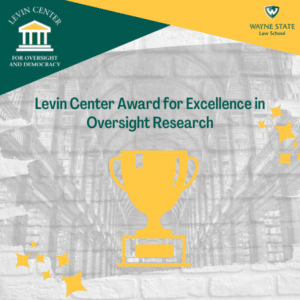Professor Claire Leavitt wins 2025 Levin Center Award for Excellence in Oversight Research

Today, the Carl Levin Center for Oversight and Democracy announced that the winner of its 2025 Award for Excellence in Oversight Research is “I’ll be the Oversight”: Lessons from the (First) Trump Era, by Claire Leavitt, Assistant Professor of Government at Smith College in Northampton, MA. Chosen by a selection committee composed of law and political science scholars and oversight experts, the award-winning paper emerged from a competitive field of excellent candidate papers. The award includes a $2,500 cash prize.
“The Levin Center is honored to bestow its 2025 award on a deeply researched and timely paper that sheds light on congressional oversight during a pivotal period in modern U.S. politics,” said Jim Townsend, director of the Carl Levin Center for Oversight and Democracy. “Professor Leavitt’s work uses rich data on hearings and reports to illuminate what Congress chose to investigate and how the executive branch responded during the second Obama and first Trump administrations. This analysis offers valuable context for understanding changes in the balance of power between Congress and the executive branch, and the Trump Administration’s efforts to expand executive power at Congress’s expense.”
The selection committee found that Professor Leavitt’s paper leverages data on congressional hearings and reports to explore oversight patterns and executive cooperation during two contrasting presidential administrations. The Committee highlighted the paper’s nuanced account of how oversight priorities shifted and how those shifts intersected with broader struggles over the separation of powers. By situating the Trump Administration’s oversight conflicts in relation to the preceding Obama years, the paper provides important context for evaluating the health of legislative oversight and the resilience of checks and balances.

“I am excited and honored to receive the 2025 Award for Excellence in Oversight Research from the Levin Center,” said Professor Leavitt when accepting the award. “When I began work on this paper in 2023, I assumed it would serve as a purely retrospective analysis of what some viewed as a nontraditional or outlier president’s noncompliance with congressional oversight requests compared with his predecessor.
Trump’s re-election in 2024, however, underscores just how important it is for scholars and policymakers to extract key lessons from his first term in order to fully understand the effects that not only the Trump presidency but also the broader Trump era will have on the investigative process moving forward. I thank the Levin Center for its recognition of my article, recently published in The Forum, and cannot wait to get started on analyses of Trump 2.0.”